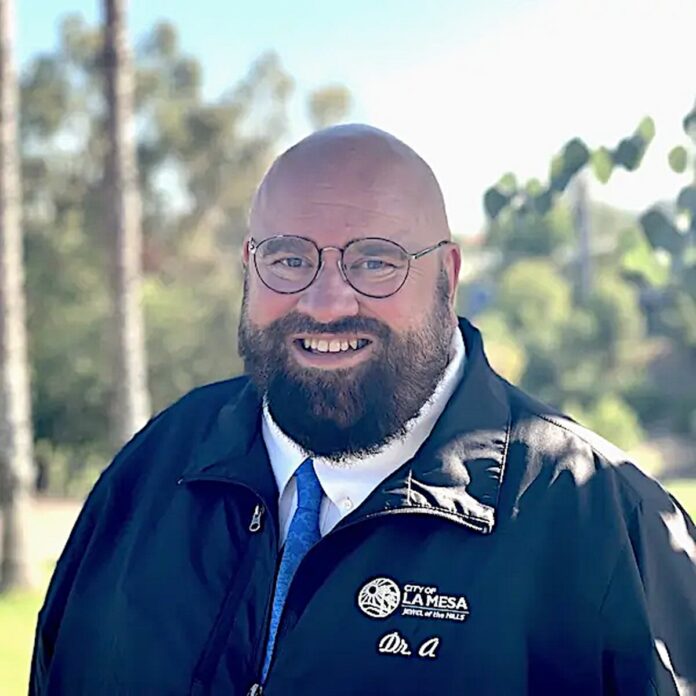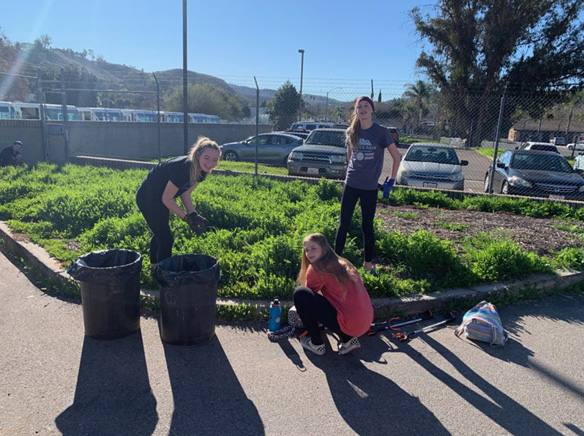Mark Arapostathis, 56, is a full-time teacher at La Mesa Arts Academy by day and Mayor of La Mesa by night, a position he’d like to retain through one more term as an incumbent.
His campaign donations hover around $100 apiece, mostly from individuals, with one larger $4,900 donation from the Laborers International Union of North America.
If re-elected, his goal is to double the number of Homeless Outreach Mobile Engagement program personnel.
“Our HOME program is still new but there’s been some success with it— we’ve placed almost 70 people in permanent housing. In addition, we need to look at the homeless situation in La Mesa and triage it, take a step back and treat mental health cases individually, look at our lack of housing,” Arapostathis said.
Working in education, he said, professionals look at a bell curve of people who are not seeing success; the bottom two percent are harder to turn around than those in the 69th percentile who need just a small boost to change their outcome.
Starting with that cohort, he said, makes sense.
“Everyone’s susceptible to homelessness but we can’t treat everyone the same. Substance abuse challenges, for example, are not the same as mental health challenges. And the more we can fight against someone becoming homeless, the less likely they are to ever become homeless,” Arapostathis said.
However, he said, there is still a need to help those who have been on the streets for two, three or many years.
“We have to partner with agencies who are willing to help with homelessness, including private agencies. I’ve already spoken with San Diego Rescue Mission, as well as the Lucky Duck foundation. Currently, we also have a contract with the HomeStart program in El Cajon to help us find housing,” Arapostathis said, and he would continue to seek out more partnerships with long term solutions if elected.
Although he appreciates churches and other organizations that provide meals and showers, he questions “what happens on day two?” or the week after outreach events.
“Everything needs to come down to wraparound services, agencies that provide addiction services,” Arapostathis said.
He would like to pursue resources through Lucky Duck foundation but maintains that solution cannot resemble a recently erected shelter near the county psychiatric hospital on Rosecrans Avenue.
“We aren’t built like San Diego with open space, La Mesa is not that type of city,” Arapostathis said.
As a teacher, he said, he sometimes finds out about families on the verge of homelessness including two the city helped move to smaller and more affordable housing. The city, he said, is currently utilizing American Rescue Plan Act funding to provide rental assistance but if re-elected, he would like the city to pursue funding from the county.
“I don’t feel helping people who are about to become homeless has been funded well enough,” Arapostathis said.
There are several challenges to developing more affordable housing and hitting Regional Housing Needs Assessment goals, he said.
“The first challenge is we’re a built-out city. Getting our RHNA numbers where they’re supposed to be is a challenge because we don’t have the space. Another challenge is having construction that doesn’t fit with our neighborhoods. Little Flower Haven could have gone for a much higher building and less parking, but they worked with the city, and it fits within the character of the neighborhood,” Arapostathis said.
A third challenge, he said, is educating the public on what actually constitutes affordable housing and what that means for La Mesa. What’s affordable to one person might not be affordable to another— a schoolteacher like himself, he said, can’t necessarily afford something that is 20% off market value when the market is so high.
Additionally, he said, it is important to preserve the character of neighborhoods.
For example, a project at 8888 Allison Ave. is going to be all affordable housing and located on the trolley line but finding other locations where developments can be built without impacting the neighborhood, including parking, is hard.
The city needs to look for developers who will create projects that fit within the ambiance of the neighborhood and are affordable to local residents, he said.
“The final thing is we have to bring the public along. The city needs to educate the public on exactly what the law says and what can be built,” Arapostathis said, although he did not describe how he would do so.
Ultimately, he said, La Mesa is “a wonderful city because the people in it are welcoming and kind” and deserves a representative who will be honest, have integrity and show they’re thinking about opportunities when making decisions.
Incumbent Arapostathis served two terms as a City Council member before being elected as Mayor. He is the director of two non-profit youth theaters and co-founded the La Mesa Arts Alliance
“I can only serve one more term, but I’ve lived here my whole life, know the city and the people well and the people and think I’m making decisions in the best interest of La Mesa,” Arapostathis said.














